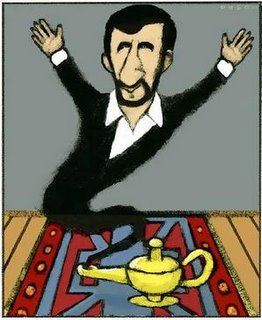
Iran's new leader fans the fires of revolution - Opinion - theage.com.au
Iran's new leader fans the fires of revolution
November 14, 2005
Page 1 of 2 | Single page
Illustration: Dyson
Iranians, both moderates and mullahs, have reason to fear Mahmoud Ahmadinejad, writes William O. Beeman.
Those who hate the clerical establishment in Iran and wish it would disappear should be delighted with President Mahmoud Ahmadinejad. Too late, the clerics have discovered that they have a tiger by the tail. Mr Ahmadinejad may be dedicated to their eradication.
The bad news for the West is that Mr Ahmadinejad's assault on the Iranian Government is an assault from the right. He has rejected both the reformist politics of President Khatami, and the establishment Islamic leadership of Ayatollah Ali Khamenei.
Mr Ahmadinejad's election was the crowning success of Iran's own neoconservative movement, the Abadgaran-e Iran-e Islami (Developers of an Islamic Iran), or the Abadgaran for short.
The Abadgaran have been described as second-generation revolutionaries. They are people who participated in the Revolution of 1978-79, who have become disillusioned with the ruling clerical establishment in Tehran, and have been dedicated to re-establishing the ideals of the original revolution. In the past 26 years they have grown up and established themselves in positions of power everywhere.
They were the dominant political group in almost every major municipality in Iran before the election. Operating from the mosques, just as in the original revolution, they flew under the media radar, thus creating an illusion of surprise when Mr Ahmadinejad roared to victory on a populist platform promising economic reform and financial equality for Iran's poor.
Mr Ahmadinejad appeared benign enough in June. A pious, ruthlessly honest and modest civil engineer, he had done an excellent job as Tehran's mayor. However, he immediately sent shockwaves through the establishment by proposing ill-suited ideologues as ministers in his new Government, by his badly received appearance at the United Nations, by his fiery condemnation of the "Zionist regime" in Israel - an action that attracted international condemnation - and finally, by his recall of 40 moderate Iranian ambassadors.
His actions have caused consternation in segments of the Iranian public as well. On November 3, his Government introduced a scheme to provide shares of national industries to Iran's poor, allowing them 20 years to repay the cost of the equities. Rumours have flown that the next target is Iran's private industrial holdings. There is no opposition between Islam and capitalism, and Iran is ruthlessly capitalist.
Iranian owners of industry were not going to wait to find out whether the rumours were true. Reportedly more than $US200 billion ($A270 billion) in investment income has fled Iran for Dubai, where about 2000 new businesses have been established in the past four months. The capital flight was accelerated by Mr Ahmadinejad's remarks against Israel, after which the Tehran stock exchange plummeted to its lowest point in two years.
The irony for the establishment clerics was that no matter who won the election they were going to be in trouble, since all candidates but the one they had handpicked, former radio and television head Ali Larijani, opposed one or another aspect of their governance. Mr Larijani has now been reappointed as head of Iran's Supreme National Security Council and chief negotiator for Iran's nuclear energy initiative with European powers and the United Nations.
His reassignment is indicative of the current state of affairs, as cracks begin to show in Iran's Islamic leadership. Confusion reigns as the establishment clerics try to contain Mr Ahmadinejad while presenting a smooth face to the world.
The Iranian Foreign Ministry as well as Ayatollah Khamenei tried to soften Mr Ahmadinejad's anti-Israel remarks and assure the world that Iran intended no violence against any other nation. Presidential runner-up Ali Akbar Hashemi Rafsanjani, who went back to his old job as head of Iran's intra-governmental Expediency Council, has quietly moved to relieve Mr Ahmadinejad of his foreign policy and diplomatic duties. However, Hashemi Rafsanjani, and other clerics rumoured to be rich and corrupt, are anathema to the Abadgaran that support Mr Ahmadinejad.
What is at stake is nothing less than the Islamic Republic itself if an internal feud breaks out.
The velayat-e-faqih - or rule of the chief jurisprudent - on which Iranian government is based, and through which Ayatollah Khamenei holds his authority, was established after the revolution. No senior Shiite cleric in the world agrees with it any longer.
If Mr Ahmadinejad is placed under too much pressure by the likes of Ayatollah Khamenei or Mr Rafsanjani, he may well have the political clout through his followers to force a reconsideration of the entire basis of Iranian government. There are many Iranians who would welcome such a move.
The Iranian Parliament is eager to overhaul the Iranian constitution, which gives control of government to the clerics, but they have been prevented from doing so by the powerful, indirectly chosen Council of Guardians. The result of constitutional revision might still be an Islamic Republic not to the taste of the Bush Administration, but it would end clerical rule in Iran. One thing is certain: change is inevitable in Iran. Moreover, President Ahmadinejad and the Abadgaran, if they achieve their aims, should not rest on their laurels.
The whirlwind he is setting in motion today is nothing compared to the tornado that will sweep into power in the next decade - the youth of Iran, who in five years will be the majority of voters.
None of them participated in the original Revolution, brought the Ayatollah Khomeini to power, or ratified the Islamic Republic.
William O. Beeman is professor of Middle East anthropology at Brown University in the US. He has conducted research in Iran for more than 30 years and is the author of The "Great Satan" vs. the "Mad Mullahs": How the United States and Iran Demonize Each Other.



